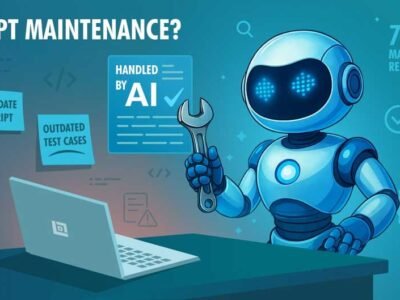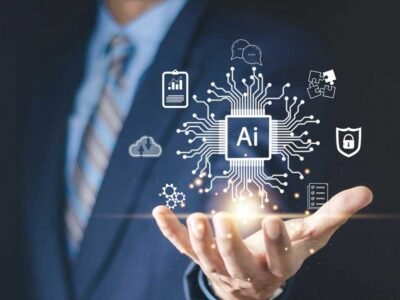The emergence of artificial intelligence (AI) is among the most revolutionary technological transitions in our time, with far-reaching consequences for the worldwide labour market. Instead of a future product, AI has already begun automating mundane tasks, enhancing human abilities, and creating entirely new business models. The transition gives rise to an important argument: will artificial intelligence (AI) ultimately replace human employees or create new opportunities for development and advancement? The response is multifaceted, implying a future where job descriptions are reimagined instead of disappearing. The companies leading this revolution are artificial intelligence development services, which design and deploy the smart systems that will transform our work. Businesses, policymakers, and individuals planning for the future of the workplace must be aware of this revolution.
Automation of Repetitive and Physical Tasks
One of the most direct and earliest effects of AI is automating repetitive, predictable tasks in many industries. In industry, robots and vision systems construct and quality-check with unprecedented precision and stamina. In clerical processes, computer programs based on AI, such as data entry, bill paying, and scheduling, are automated. Automation concerns mainly repetitive manual and mental work, releasing human workers from drudgery. Although this is a problem of displacement for some jobs, it also enables the workforce to dedicate more time to higher-level, more strategic, and innovative work of higher value, ultimately leading to productivity and operational capability in organisations.
The Generation of New Job Types and Industries
Although some jobs will be lost, artificial intelligence (AI) is also driving the generation of new types of jobs and industries in total. Professions like AI ethicists, machine learning engineers, data annotation specialists, and automation managers are in higher demand every day. New entire industries are being built up around development, upkeep, and ethical control of AI systems. Furthermore, as businesses become increasingly integrated with AI, human-AI collaboration management-based positions will become mainstream. This is a generative impact, and what it will not be is a labour market of lost opportunities but, instead, a reassignment of skills and the ability to learn new technological paradigm paradigms.
The Need to Reskill and Upskill the Workforce
The acceleration of AI in the workforce requires a huge investment in reskilling and upskilling programs. With the need for everyday skills vanishing, requirements for knowledge in data literacy, critical thinking, emotional intelligence, and collaboration with AI are on the rise. Governments, schools, and companies have to join forces to produce affordable training bundles. Career resilience will no longer be an extravagance but a necessity, with lifelong learning. This emphasis on ongoing skill development is essential to making the existing workforce agile and able to shift into new AI-driven roles and not replaced by technology advancements.
Redesigning the Recruitment and Hiring Process
AI is actually revolutionising the way businesses hire and evaluate talent. Recruiters use AI programs to sift through enormous numbers of applications and select those candidates with experience and skills nearest to what the job requires. Advanced algorithms can even diminish unconscious bias by concentrating on sheer facts. Additionally, AI-powered platforms can foretell candidate success and compatibility within business culture. But this is also creating some fundamental questions regarding algorithmic justice and individual data protection. The HR role is transforming, and specialists need to be capable of leveraging these AI tools effectively to maintain a human touch and a fair recruitment process.
The Emergence of the Gig Economy and Flexible Work
AI platforms are helping to fuel the gig economy through efficient matching of temporary assignments and projects with freelance employees. From ride and delivery apps to professional consulting platforms, AI algorithms match supply and demand at unprecedented speeds. This generates a more autonomous and flexible worker. It also generates issues of job security, benefits, and income stability. The future can also witness an amalgamation of a hybrid workforce of full-time workers supported by AI-driven freelancers that will need new organisational systems of labour rights, remuneration, and business culture in this more adaptable working era.
Increased Emphasis on Soft and Creative Competencies
As AI does more technical and analytical work, human capabilities will be appreciated more. Human beings excel at creativity, emotional intelligence, problem-solving, persuasion, and teamwork. With empathy and human touch careers, including caregiving, teaching, and management, will take centre stage. The workplace of the future will surely appreciate such soft skills that cannot be mechanised. Such a turn points to the significance of holistic education that empowers individuals with technical skills and natural human abilities to flourish in harmonious work with intelligent machines.
Conclusion
Defined by artificial intelligence, the future of work is complex and presents great possibilities as well as hitherto unheard-of obstacles. It is a narrative of change and adaptation rather than one of man against machine or substitution. Our future depends on a forward-thinking approach: embracing lifelong education, making the cultivation of uniquely human abilities a priority, and developing ethical norms to steer this technological adoption. Guided leadership of this change will allow us to tap the potential of artificial intelligence to create a more imaginative, productive, and above all, human-centred workplace. The future is when technology supplements our potential rather than comes at its expense.









